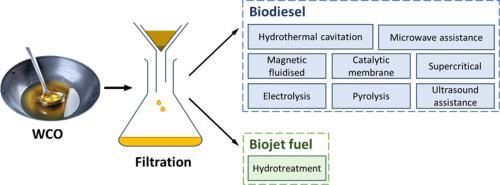当前位置:
X-MOL 学术
›
Energy Convers. Manag.
›
论文详情
Our official English website, www.x-mol.net, welcomes your feedback! (Note: you will need to create a separate account there.)
Progress in utilisation of waste cooking oil for sustainable biodiesel and biojet fuel production
Energy Conversion and Management ( IF 10.4 ) Pub Date : 2020-11-01 , DOI: 10.1016/j.enconman.2020.113296 Brandon Han Hoe Goh , Cheng Tung Chong , Yuqi Ge , Hwai Chyuan Ong , Jo-Han Ng , Bo Tian , Veeramuthu Ashokkumar , Steven Lim , Tine Seljak , Viktor Józsa
Energy Conversion and Management ( IF 10.4 ) Pub Date : 2020-11-01 , DOI: 10.1016/j.enconman.2020.113296 Brandon Han Hoe Goh , Cheng Tung Chong , Yuqi Ge , Hwai Chyuan Ong , Jo-Han Ng , Bo Tian , Veeramuthu Ashokkumar , Steven Lim , Tine Seljak , Viktor Józsa

|
Abstract The increase in human consumption of plant and animal oils has led to the rise in waste cooking oil (WCO) production. Instead of disposing the used cooking oil as waste, recent technological advance has enabled the use of WCO as a sustainable feedstock for biofuels production, thereby maximising the value of biowastes via energy recovery while concomitantly solving the disposal issue. The current regulatory frameworks for WCO collection and recycling practices imposed by major WCO producing countries are reviewed, followed by the overview of the progress in biodiesel conversion techniques, along with novel methods to improve the feasibility for upscaling. The factors which influence the efficiency of the reactions such as properties of feedstock, heterogenous catalytic processes, cost effectiveness and selectivity of reaction product are discussed. Ultrasonic-assisted transesterification is found to be the least energy intensive method for producing biodiesel. The production of bio-jet fuels from WCO, while scarce, provide diversity in waste utilisation if problems such as carbon chain length, requirements of bio-jet fuel properties, extreme reaction conditions and effectiveness of selected catalyst-support system can be solved. Technoeconomic studies revealed that WCO biofuels is financially viable with benefit of mitigating carbon emissions, provided that the price gap between the produced fuel and commercial fuels, sufficient supply of WCO and variation in the oil properties are addressed. This review shows that WCO is a biowaste with high potential for advanced transportation fuel production for ground and aviation industries. The advancement in fuel production technology and relevant policies would accelerate the application of sustainable WCO biofuels.
中文翻译:

利用废弃食用油生产可持续生物柴油和生物喷气燃料的进展
摘要 人类对动植物油消费量的增加导致废食用油 (WCO) 产量增加。最近的技术进步不是将用过的食用油作为废物处理,而是将 WCO 用作生物燃料生产的可持续原料,从而通过能源回收最大限度地提高生物废物的价值,同时解决处置问题。审查了 WCO 主要生产国对 WCO 收集和回收做法的当前监管框架,然后概述了生物柴油转化技术的进展,以及提高升级可行性的新方法。影响反应效率的因素,如原料性质、多相催化过程、讨论了反应产物的成本效益和选择性。超声波辅助酯交换被发现是生产生物柴油能耗最低的方法。如果可以解决碳链长度、生物喷气燃料性能要求、极端反应条件和所选催化剂载体系统的有效性等问题,那么从 WCO 生产生物喷气燃料虽然稀缺,但可以提供废物利用的多样性。技术经济研究表明,WCO 生物燃料在经济上是可行的,并具有减少碳排放的好处,前提是生产燃料和商业燃料之间的价格差距、WCO 的充足供应和石油特性的变化得到解决。该审查表明,WCO 是一种生物废物,在为地面和航空工业生产先进的运输燃料方面具有巨大潜力。燃料生产技术和相关政策的进步将加速世界海关组织可持续生物燃料的应用。
更新日期:2020-11-01
中文翻译:

利用废弃食用油生产可持续生物柴油和生物喷气燃料的进展
摘要 人类对动植物油消费量的增加导致废食用油 (WCO) 产量增加。最近的技术进步不是将用过的食用油作为废物处理,而是将 WCO 用作生物燃料生产的可持续原料,从而通过能源回收最大限度地提高生物废物的价值,同时解决处置问题。审查了 WCO 主要生产国对 WCO 收集和回收做法的当前监管框架,然后概述了生物柴油转化技术的进展,以及提高升级可行性的新方法。影响反应效率的因素,如原料性质、多相催化过程、讨论了反应产物的成本效益和选择性。超声波辅助酯交换被发现是生产生物柴油能耗最低的方法。如果可以解决碳链长度、生物喷气燃料性能要求、极端反应条件和所选催化剂载体系统的有效性等问题,那么从 WCO 生产生物喷气燃料虽然稀缺,但可以提供废物利用的多样性。技术经济研究表明,WCO 生物燃料在经济上是可行的,并具有减少碳排放的好处,前提是生产燃料和商业燃料之间的价格差距、WCO 的充足供应和石油特性的变化得到解决。该审查表明,WCO 是一种生物废物,在为地面和航空工业生产先进的运输燃料方面具有巨大潜力。燃料生产技术和相关政策的进步将加速世界海关组织可持续生物燃料的应用。


























 京公网安备 11010802027423号
京公网安备 11010802027423号